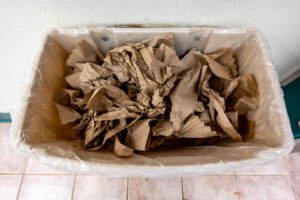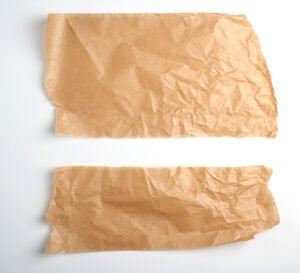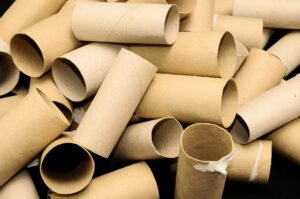A lot of people rely on coffee to get them up for the day. But more delicious coffee means more coffee filters and grounds in the bin. As you’re probably aware, coffee grinds make a fantastic compost ingredient. But what about filters? Can you compost coffee filters too? If so, how?
Key Takeaways
- Coffee filters made of natural, unbleached paper are compostable and add carbon, acids, and other rich nutrients to the compost.
- If the filters are made of synthetic materials like linen or contain chemicals, they should not be composted.
- You can compost natural coffee filters through regular outdoor composting in a compost bin or pile, as well as Vermicomposting.
- Although bleached coffee filters are compostable, their chlorine content may be toxic to composting bacteria.
Are Coffee Filters Good for Compost?
As a coffee lover and naturalist, you’ll be happy to hear that a paper coffee filter is an excellent addition to compost. It is a carbon-rich, dark compost material that will help balance the carbon-nitrogen ratio in a compost pile.
But wait, there’s more! Using coffee filters in your compost heap will also help control foul odor control and maintain an adequate level of oxygen, both of which are essential for healthy composting.
Finally, paper coffee filters will help to structure the compost and improve aeration.
How to Compost Coffee Filters?
So you now know that coffee filters are compostable and, in fact, beneficial to your finished compost. Now it’s time to learn how to do it effectively!
Natural paper coffee filters decompose quickly in the presence of heat and oxygen. So, they can be composted using common methods, like aerated bin composting, vermicomposting, hot composting, in-vessel composting, and tumbler composting.
If you already have a composting setup thriving in your garden or backyard, all you have to do is collect the coffee paper filters, shred them, and add them to the bin with other kitchen scraps.

But, if you’re starting a new compost bin to compost coffee filters, take the following steps:
Step 1: Gather and Shred Compostable Coffee Filters
Collect all the natural, compostable coffee filters and shred them using scissors or a paper shredder.
Remember to compost only natural, unbleached filters for composting. You can also compost the filters and the grounds together.
Step 2: Mix the Shredded Filters with Browns
Mix the coffee filter pieces with other brown materials such as yard waste, wood chips, dried leaves, sawdust, pine needles, paper bag, newspaper, cardboard shredding, and so on.
Now, make a firm layer of all these brown materials at the bottom of the bin.
Brown materials are carbon-rich and dry in nature. They keep the compost pile aerated and add structure to the final compost.
Step 3: Add Food Scraps
After the first layer of browns, add nutrient-dense food waste.
Food scraps such as vegetable and fruit peelings, eggshells, shrimp shells, coffee grounds, pumpkin and watermelon rinds, and so on are great sources of nitrogen for the compost.
Avoid composting oily, greasy foods, bones, or meat since they may attract rodents and bugs and harm the microbes.
Step 4: Repeat the Layers
Rep the layers of greens and browns in your compost bin alternately.
Maintain a good ratio of greens to browns. You can start with a 3:1 ratio (3 parts browns to 1 part greens) but maintain the content per the pile’s requirements.
Step 5: Maintain the Compost Bin
Keep an eye on your bin and supply it with the required materials. Also, remember to rotate your pile regularly.
If your pile leaks and stinks, add more dry, brown stuff and regularly flip it. And add more greens if it’s inactive and cold.
With proper care and maintenance, you can have finished compost in a matter of months.
Can You Compost Coffee Filters via Vermicomposting?
Yes, you can compost organic paper coffee filters in a worm bin or worm farm. Because they are composed of natural fibers and decay quickly, red worms love feeding on them.
Furthermore, moist coffee filter papers decompose even faster. Therefore, the worms will love them more. So, if you’re adding filters to your worm bin, keep it moist.
However, don’t put any synthetic or chemically treated filters in your worm bin; they won’t decompose and will slow down the composting process. Moreover, the chemicals in synthetic filters might kill worms and contaminate your finished compost.
How Long Do Coffee Filters Take to Break Down?

Coffee filters typically decompose in 5-10 months. But if you leave your filters in your compost pile to dry out, they may take longer to decay. So, it’s best to keep your pile moist when adding the coffee filter.
Apart from the type of coffee filter, pile temperature, moisture, aeration, and weather conditions all have an impact on the decomposition rate. So, ensure that all of the conditions are met.
An excellent way to speed up decomposition is to turn the compost pile regularly to improve aeration and provide enough oxygen to the microorganisms.
Can you Compost Bleached Coffee Filters?
Technically, you can compost a bleached filter because it is just treated with chlorine to turn the paper white, which is not a very hazardous chemical to the soil.
But, chlorine can disrupt the bacteria that function in the compost pile, potentially halting the composting process.
So, it’s safer and healthier to compost unbleached filters in both an open compost bin and a worm bin.
Tips for Composting Coffee Filters
Follow these beneficial tips for efficient and effective coffee filter composting:
- Make sure to compost only natural and unbleached paper coffee filters.
- Shred the filters before adding them to the compost heap to speed up decomposition.
- Avoid adding too many coffee filters at once as they can clump and block air.
- Add coffee filters along with the coffee grounds to balance the nitrogen-to-carbon ratio.
- Keep your pile moist to ensure the paper coffee filters break down properly.
4 Interesting Uses of Coffee Filters
Coffee filters are not only a healthy addition to compost, but they can also be reused in a variety of ways:
1. Glass Surface Cleaning:
A coffee filter can be used to clean windows, glasses, mirrors, television monitors, and other surfaces without leaving any scratches. So, save coffee filters for cleaning if you don’t want to compost them.
2. Plant Pot Linings:
Besides being used in a coffee maker, Coffee filters can also be used in plant pots. Filters create an effective drainage system for your plants by keeping the soil moist in the pot while draining excess water.
3. Stacking Fragile Objects:
Coffee filters can also be used to store delicate items such as crockery, dishes, etc. Simply place a coffee filter between the items to protect them from scratches.
4. Nail Polish Remover:
It may sound surprising, but a paper filter can be used to remove nail polish. It is, in fact, more durable for this purpose than cotton balls.
Does the coffee filter contain plastic?
Regular single-use coffee filters are made of filter paper and paper pulp and do not contain any plastic. So, they are compostable. But plastic coating filters are also available in the market, so make sure you pick the natural ones if you want to compost them.
Is the Coffee filter recyclable?
Coffee filters are not recyclable, but because they are biodegradable, they can be composted.
Are bamboo coffee filters biodegradable?
Bamboo coffee filters are biodegradable and, as a result, compostable. Simply shred the used filter and add it to the compost bin, and you’re done. Put the filter in the center of the heap for best results.
Are coffee filters reusable?
Most paper coffee filters can be reused up to 3-4 times. So you can throw away the old coffee grounds and use the same paper filter in your coffee machine.
Composting is an excellent way to keep your environment healthy. So, after you’ve made a delicious cup of coffee, don’t throw away the coffee filters. Instead, save and compost them.
Paper towels are another vital item on the list that may be used in several ways for plants and gardens. So, if you want to learn about composting paper towels, join us now!








